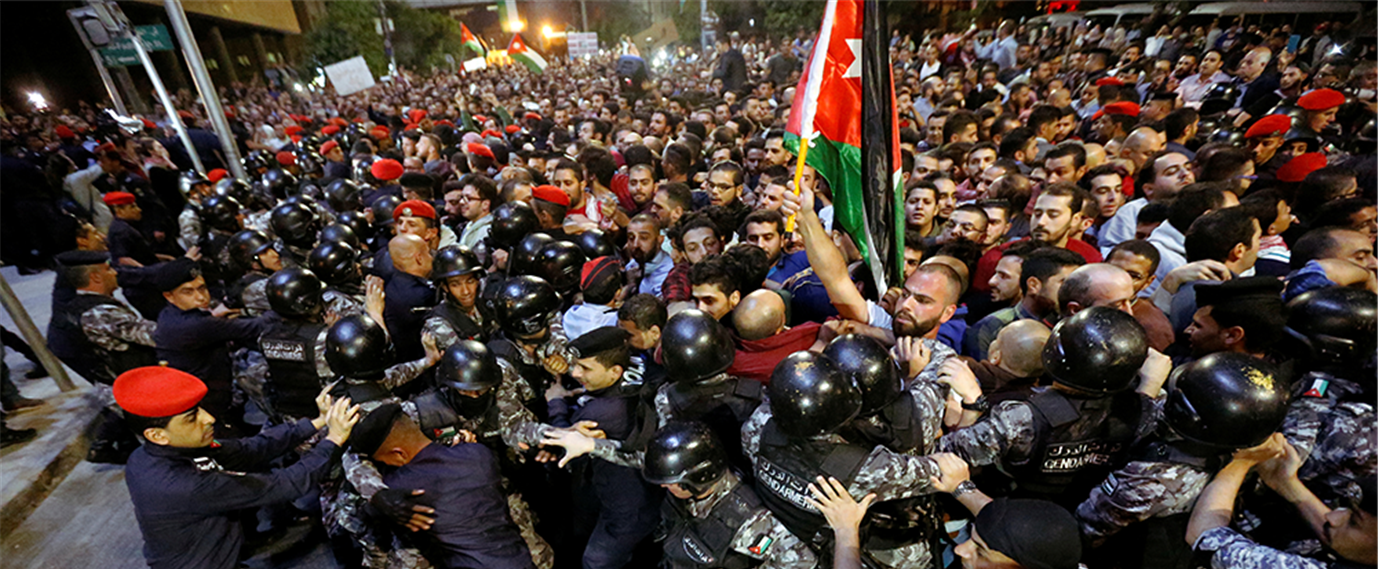تقلَّدت الهواتف المحمولة لصحفيي الأردن أدوار البطولة في تغطية الاحتجاجات التي تشهدها محافظات المملكة الأردنية الهاشمية مؤخرا، وتمكّنت تلك الأجهزة من "فش غل" (إرضاء) المتابعين، في الوقت الذي كانت تغطية وسائل الإعلام المحلية للاحتجاجات شبه متواضعـة.
وتشهد الأردن منذ قرابة الأسبوع احتجاجات واسعة امتدت إلى كافة محافظات المملكة تنديدا بمشروعي قانون ضريبة الدخل ونظام الخدمة المدنية المقرَّر إيجازهما من قبل الحكومة، وكانت شرارة انطلاقة هذه الاحتجاجات، الإضراب العام الذي دعت إليه النقابات المهنية الأردنية يوم الأربعاء الماضي، 30 مايو/أيار 2018.
وفي قراءة سريعة لآلية تغطية الإعلام الأردني المحلي للاحتجاجات، كشفت المؤشرات أن الوسائل الإعلامية، وبالأخص الصحف، كانت تغطيتها متواضعة، بل ومنها ما كان غائبا، وتفوقت عليهم بعض المواقع الإلكترونية الإخبارية، لكن من تصدر المشهد صحفيو الاحتجاجات الذين كانوا ينقلون الحدث أول بأول من خلال أجهزتهم المحمولة وعبر خدمة الفيسبوك لايف.
وفي تقرير صادر عن موقع "أكيد"، وهو موقع متخصص برصد المواضيع الإعلامية الأردنية جاء فيه: "غاب الإعلام الرسمي عن تغطية الاحتجاجات التي تشهدها البلاد في ظل الظروف والتطورات المتلاحقة التي بدأت بالإضراب النقابي في مواجهة مشروع قانون ضريبة الدخل والاحتجاجات التي ارتفعت وتيرتها مع رفع أسعار المحروقات يوم الخميس الماضي، وما رافقها من أحداث، ولم يستفد الإعلام الرسمي من دروس الأزمات السابقة".
وجاء أيضا: "غياب الإعلام الرسمي بمؤسساته وشخوصه ترك الجمهور والمواطنين عرضة للشائعات وللأخبار غير الصحيحة وسيطرة كبيرة للإعلام الاجتماعي ووسائل الإعلام الخارجية، ويعد هذا الغياب تجاوزا على حق المواطنين بمعرفة ما يحدث، من تطورات تمسهم بشكل مباشر، في الوقت الذي اتسعت فيها مساحة الإعلام البديل وتسابقت مواقع إخبارية على تداول أخبار غير دقيقة أحيانا".
وأشار موقع "أكيد" إلى أهمية وسائل التواصل الاجتماعي وتحديدا شبكة الفيسبوك وتطبيق الواتساب في تكوين مصادر الأخبار للمواطنين، لا سيما باستخدام تقنية التصوير المباشر التي يوفرها "فيسبوك".
وطرح "أكيد" في تقريره غياب بعض الصحف اليومية الرئيسية (الرأي والدستور) عن تغطية الأحداث منذ إضراب الأربعاء إلى الاحتجاجات اللاحقة، فيما تفاوتت تغطية وسائل الإعلام الخاصة الأخرى، وناقش "أكيد" هذ الجانب من تغطية الأحداث في تقرير منفصل.
خبرة ضحلة
بدوره قال عضو مجلس نقابة الصحفيين خالد القضاة تعليقا على تغطية وسائل الإعلام الأردنية للاحتجاجات: "أعتقد أن خبرة الصحفيين المحليين في التعامل مع الأحداث الساخنة وبؤر التوتر ما زالت ضحلة وبحاجة إلى تطوير بما يضمن سلامة الصحفيين وقيامهم بعملهم على أكمل وجه". وشرح القضاة الأخطاء التي وقع فيها الصحفيون في تغطية الأحداث، ومنها "عدم حملهم لما يُثبت عملهم كصحفيين من هويات معتمدة وباجات صادرة من مؤسسات إعلامية، معتمدين على معداتهم لتعرِّف بهم، وهي بالعادة لا تكفي ولا يُعتد بها لإثبات الشخصية الصحفية. إضافة لعدم معرفتهم بخارطة الموقع والطرق الرئيسية والفرعية واتجاهات السير فيها، وعدم الاستعداد المسبق للتغطية من ناحية اللبس الملائم والمعدات الاحتياطية وشحنها بما يكفي لمدة الاعتصام المفترضة، وعدم القدرة على توقع تحركات المتظاهرين وقوات الأمن، مما يجعل الصحفي أحيانا خارج المشهد تماما أو عالقا بين الحشود أو يظهر بمظهر المتحيز لطرف ضد آخر، مشدِّداً (القضاة) على واجب الصحفي في فهم قواعد الاشتباك التي تطبقها قوات الأمن.
ونشطت كل المؤسسات الإعلامية بتغطية خاصة بها للأحداث وفقا لسياستها التحريرية، واستخدمت الصور والفيديوهات بكثرة، ونافست وتقدمت على الناشطين باستخدام منصاتها على شبكات التواصل الاجتماعي، سواء بالبث المباشر والصور والمقابلات. ولكن هذه التغطية، بحسب القضاة، اعتمدت على الأخبار القصيرة، دون الخوض بالتفاصيل والربط بين الأحداث، وحملت في طياتها الكثير من الشائعات والأخبار المغلوطة، نظرا لتسارع الأحداث وغياب تصريحات من الجهات الرسمية وذات العلاقة.
المواطن الأردني يحل أجزاء اللغز
يصف الصحفي عماد الرواشدة المشهد بقوله إن هناك فقرا واضحا في فهم طبيعة العمل الصحفي، وخصوصا الإلكتروني في الأردن.. "نجد أن غالبية المواقع تتعامل مع المحتوى الصحفي باعتباره نقلا لخبر عاجل، لذلك تتسابق المواقع لنقل آخر التطورات على اجتماعات الحكومة والنقابات مثلا، وفِي سعيها لتكون الأولى تقدم معلومات مجتزأة دون بيان سياق الحدث وخلفياته، بالاعتماد على مصادر مجهولة، وغالبا دون حتى روابط تشعبية لتعميق فهم المتلقي". ويتابع، "نادرة جدا وتكاد تكون معدومة، تلك المواد التي تثقف الرأي العام الأردني بطبيعة علاقة البلاد بالصندوق مثلا، ماذا تعني؟ وما هي خلفياتها؟ وما صلتها بما يجري الآن من احتجاجات؟ وهل بوسع السلطات الاستعاضة عن تلك العلاقة؟ كلها أسئلة بلا إجابات للمواطن الأردني.. المواد المعمقة والتثقيفية والتحليلية شبه غائبة وما يسود المشهد هو محض أخبار عاجلة متناقضة وغير دقيقة منزوعة من سياقاتها أربكت الرأي العام، ونشرت الإشاعة والإحباط".
ويشرح الرواشدة أن المواطن الأردني أو غيره "لن يكون بمقدوره بناء موقف سياسي أو الإقدام على فعل سياسي ما دون معلومة ووعي بما يجري حوله ودون فهم للدور الذي تلعبه السلطات". ويرى أن من أدوار الإعلام خلق ذلك الوعي.. "لذا تعتبر الصحافة أساسية في النظم الديمقراطية، إذ لا يمكن خلق أو الحفاظ على حالة ديمقراطية فاعلة دون صحافة فاعلة ومهنية مدركة لدورها في خدمة الصالح العام ومتمكنة من أدواتها في أداء هذا الدور". ويوضح الرواشدة أن المتلقي الأردني يبذل جهدا ذاتيا في سبيله لفهم ما يجري حوله عبر "تجميع أجزاء اللغز من كل موقع ومدونة وتغريدة وإدراج فيسبوكي على حده. لكن للأسف، تبقى هذه المعرفة عشوائية، مرتبكة ومشوشة وتعوزها الدقة". أما الإعلام الأجنبي فهو "ليس معنيا بأداء هذا الدور التوعوي، لأن لديه اهتمامات إقليمية ودولية تناسب قراءه وجمهوره المستهدف، والأردن غالبا ليست ذات صلة كبيرة في السياق.. لا بديل عن إعلام محلي ناضج وواعي ومهني".
من جهتها اعتبرت الصحفية والمتخصصة برصد الأخبار التي تنشرها الوسائل الإعلامية سوسن زايدة، أن مواقع التواصل الاجتماعي، بالأخص فيسبوك وتويتر هم من تصدروا المشهد في تغطية أحداث الاحتجاجات التي تشهدها الأردن، إلا أن تلك الأخبار تأتي دون تحليلات، ما يجعل المتلقي يبني تصوّره الخاص. وهي تعتقد أنه "من المبكر التعمق أكثر بالتحليل في تغطية الوسائل الإعلامية المحلية للاحتجاجات، خصوصا وأن الأحداث متسارعة، ومن العبث تضييع الوقت في متابعة ما يغطيه الإعلام السائد".
وقد لاحظت سوسن أن الصحفيين أنفسهم يعبرون عن آرائهم ومواقفهم بحرية أكبر عبر مواقع التواصل الاجتماعي "دون تحرير أو تضييق وقصٍّ من الرقيب، بحيث ينشرون المادة الخام كما تأتي من الميدان".








































